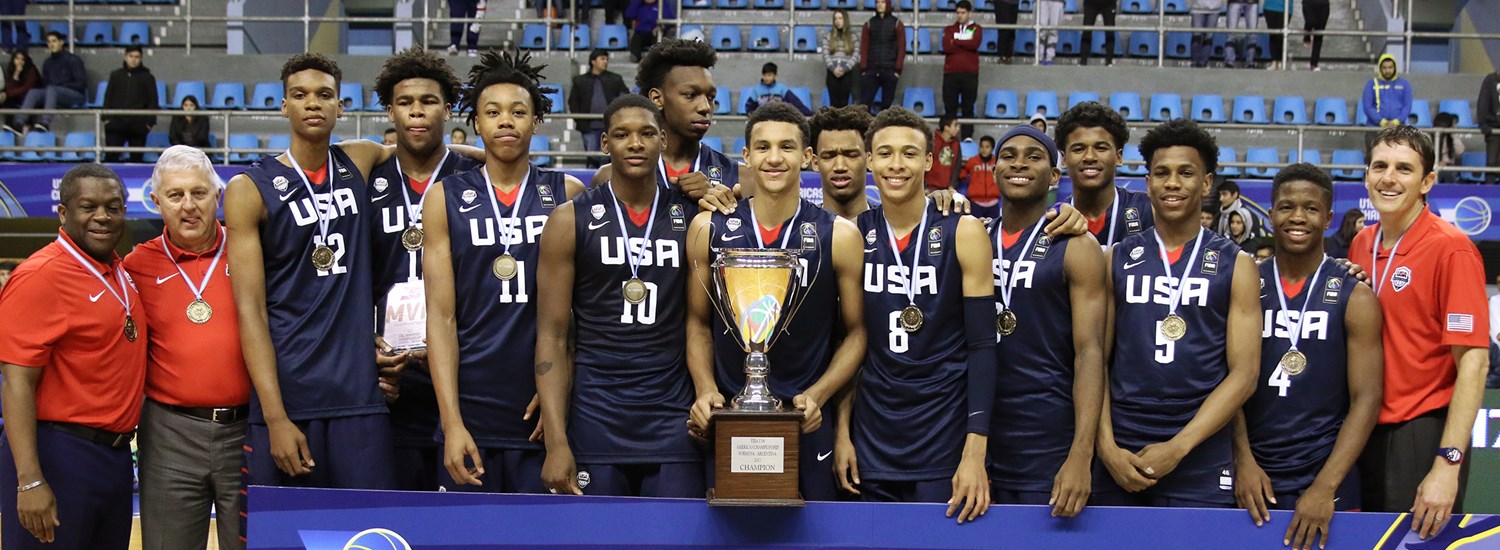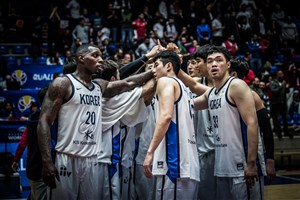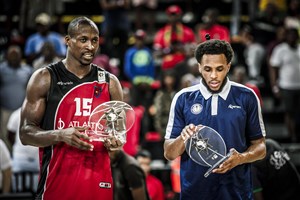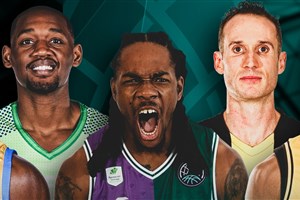
Battle for FIBA U16 Americas' four spots in U17 World Cup will be fierce
REGENSBURG (David Hein’s Eye on the Future) - The 2019 youth national team calendar tips off in northern Brazil on June 3 with the start of the FIBA U16 Americas Championship 2019. And the biggest takeaway from the opening competition is that the battle for FIBA Americas’ four spots in the FIBA U17 Basketball World Cup 2020 will be fierce.
The eight teams battling it out in Belem until June 9 are five-time reigning champions United States, two-time reigning runners-up Canada, three-time second-placed finishers Argentina, 2017 third placed side Puerto Rico as well as hosts Brazil, Dominican Republic, Mexico and Uruguay.
The top four finishers book their tickets for the U17 World Cup and given that United States and Canada still seem the two dominant forces on the continent, every second of every game involving the other six teams will be of the utmost importance.
First off, here is the breakdown of the competition. The eight teams are broken into two groups: Argentina, Dominican Republic, Mexico and United States in Group A with Brazil, Canada, Puerto Rico and Uruguay in Group B. All eight teams will move into the Quarter-Finals with the first placed team from Group A facing the fourth placed team in Group B, second in Group A taking on third in Group B and et cetera. The four winners in the Quarter-Finals not only reach the Semi-Finals and still have a chance for a U16 FIBA Americas medal, they also will play next summer at the sixth U17 World Cup in Sofia.
The five-time U16 Americas champions - and five-time U17 World Cup winners - seem all but certain to make it to the Bulgarian capital next summer. Once again, USA Basketball has a team that is absolutely loaded with talent including Jalen Duren and Chris Livington, who are ranked second and third, respectively in the 2022 graduating high school class in the United States. There are five others in the top 25 of the 2022 class as well as four in the top 30 of the 2021 class, including 10th-ranked Max Christie.
Canada seem like a lock for the U17 World Cup as well as they will be led by the Monteverde trio of Caleb Houstan, Ryan Nembhard and Jayden Webley. Houstan played at the U17 World Cup last summer two years younger than the rest of the competition while Nembhard is the younger brother of Andrew Nembhard, who is expected to be the leader for Canada at this summer's FIBA U19 Basketball World Cup 2019. There is also DJ Jackson, who was the MVP of Canada’s U15 Boy’s National Championship for winners Ontario, which also included First All-Star Team member Josiah Davis. Jackson is also one of five players who played in the Futures Game at the 2019 BioSteel event along with Enoch Boakye, Dylan Kalambay, Leonard Miller and Shaedon Sharpe.
While United States and Canada are clearly one and two in the Americas, the rest of the region has caught up to Argentina as the third power. Argentina lost to the United States in the Finals of the first three U16 Americas tournaments and then finished third in 2015 and dropped to fourth in 2017 - both the last two events at home. For the 2019 U16 Americas, Argentina head coach Juan Gatti has nominated 10 of the 12 players back from the team that finished third at the FIBA South American U15 Championship 2018 - a group that did not feature a player who stood out save for Augusto Roveres averaging a double-double and Estaban Caffaro being the younger brother of Francisco Caffaro. But Argentina will be threatened to miss the U17 World Cup for the first time.
Also in Group A along with the United States are the Dominican Republic and Mexico. The Dominicans are in the U16 Americas for the third straight time after winning the CentroBasket U15 event and head coach Jonathan Matos will have one of the most dominant players outside the USA or Canada rosters in Jean Montero. Not only did Montero collect 25.8 points, 8.0 rebounds, 6.3 steals and 5.0 assists at the U15 CentroBasket event last summer, he also averaged 15.4 points, 4.9 rebounds, 4.1 steals and 2.9 assists at the FIBA U17 Basketball World Cup 2018. This will be Montero’s second U16 Americas tournament after picking up 9.2 points, 3.6 rebounds, 1.8 assists and 1.4 steals in 2017 while he was still 13 years old. The Dominicans, who have qualified for the last two U17 World Cups, also have Yuhanser and Angel Pimentel, who both averaged in double figures at the U15 level and the team has three new players with Gianfranco Farias, Luis Pena and Nomar Tejada.
Mexico have a new man in charge of the team that finished second Dominican Republic last summer, but Luis Moreno will have nine players back, including Bryan Ceballos, who averaged 15.8 points, 7.8 rebounds, 2.5 assists and 1.8 steals, and Miguel Figueroa, who picked up 12.3 points, 5.8 assists, 4.5 rebounds and 1.3 steals. The biggest name on the team might be new addition Gael Bonilla, who comes to the side after spending the past few years in Spain - first with the Canarias Basketball Academy and then Barcelona’s youth system.
Joining Canada in Group B will be hosts U15 South American champs Brazil, runners-up Uruguay and Puerto Rico.
Brazil also have a new coach in charge as Felipe Santana replaced the legendary Thelma Tavernari, who got the Brazilians back to the U16 Americas after missing the 2017 tournament. With nine players back, Brazil’s undisputed leader is Felipe Motta, who plays with Italian academy Stella Azzurra Rome. Motta was named MVP as he averaged 18.6 points, 6.0 rebounds and 1.6 assists. The son of an NBA scout, Motta stepped up late in the tournament with 28 points and 11 rebounds in the Semi-Finals against Argentina and then 36 points with 6 three-pointers and 6 rebounds in the Final against Uruguay. No other Brazilian scored in double figures though Rodolfo Bolis averaged 9.4 points, 9.2 rebounds, 1.8 steals and 1.0 blocks. Bolis will be a help for Motta as will Pedro Rufino, who did not play at the U15 tournament but plays together with Bolis at the NBA Academy Latin America in Mexico.
Uruguay meanwhile are making their second appearance at the U16 Americas after 2013. And the U15 South American hosts have a strong generation led by Agustin Ubal, who had 15.2 points, 3.4 rebounds, 2.6 assists, 1.6 steals and 1.2 blocks last summer. But Ubal had plenty of help as Nicolas Bessio, Rafael Previatti and Joaquin Rodriguez all averaged in double figures scoring at the U15 tournament. And the team remained the same save for just one change.
The other team is Puerto Rico, which will have a very different look with just six players returning from the side which was third at the U15 CentroBasket. The heavy lifters are back though as Johned Walker collected 19.5 points, 7.3 rebounds, 3.5 assists and 3.3 steals, Jeremy Figueroa averaged 16.5 points, 6.3 assists, 4.5 rebounds and 1.5 assists and Arnaldo Garcia chipped in 5.8 points and 10.8 rebounds. Puerto Rico head coach Raymond Cintron said the team’s shooting guards are improved with more offensive and defensive potential. And they have added players who are based in the United States.
Knowing that a victory in the Quarter-Finals is a must to qualify for the U17 World Cup, the other six teams will be doing all they can do avoid facing United States or Canada in the final eight. And with chances good of three-way ties in the group, every point could be of the utmost importance as it could decide the teams’ placings in the group.
At the same time, there will be plenty of revenge factor involved as Dominican Republic knocked off Mexico at the U15 CentroBasket tournament and they will tussle in Group A; while Brazil lost to fellow Group B team Uruguay in group play at the U15 South American Championship but then defeated hosts Uruguay in the Final.
The FIBA U16 Americas Championship 2019 promises to be a battle throughout - and in less than a week the field for the FIBA U17 Basketball World Cup 2020 will already have five teams set.
David Hein
FIBA
FIBA's columnists write on a wide range of topics relating to basketball that are of interest to them. The opinions they express are their own and in no way reflect those of FIBA.
FIBA takes no responsibility and gives no guarantees, warranties or representations, implied or otherwise, for the content or accuracy of the content and opinion expressed in the above article.

























